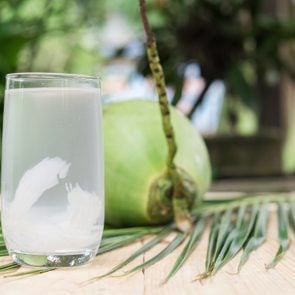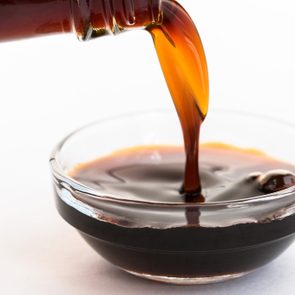Coconut Milk vs. Coconut Water: What’s the Difference?
Updated: Sep. 02, 2021
Which should you choose: coconut milk or coconut water? Experts help you decide. Plus, here are the real differences in terms of calories, protein, carbohydrates, and more.
The power of the coconut
By now, maybe we should all be tired of hearing about all things coconut. But nope! Everything from coconut milk to coconut water to coconut oil and even coconut chips only continue to grow in popularity.
And while the foodstuffs may taste delicious, some pretty surprising myths circulate about their supposed health benefits.
“I have had cancer clients tell me coconut can cure cancer by oil pulling,” says Stacy Davis, a registered dietitian in Fort Lauderdale, Florida.
Meanwhile, Ashley Harpst, a registered dietitian in San Diego, says some of the craziest health claims she’s heard include that coconut speeds up your metabolism, and that coconut water has anti-aging properties.
“Well-hydrated individuals will look and feel better, but you can accomplish this by drinking water,” she says. “There is no conclusive research to support the anti-aging benefits of coconut water.”
And then there’s the seemingly never-ending heart-health debate.
“People are still claiming that coconut oil is heart-healthy,” says Kelsey Lorencz, a registered dietitian nutritionist at Graciously Nourished.
“While it may not be as ‘bad’ for heart health as [pure] saturated fats, it’s far from the healthiest oil for your heart.”
Many of the studies showing that coconut oil is better for your health than other saturated fats use 100 percent MCT coconut oil, not the kind you’ll typically buy, according to Lorencz.
“Traditionally purchased coconut oil has the same LDL-cholesterol-raising effect as other saturated fats,” she says
And what about coconut beverages? We can embrace several health benefits of both coconut milk and coconut water. As a plant-based registered dietitian, one of the most-celebrated benefits is also the simplest—and one I utilize in my own life.
Coconut milk, especially the unsweetened variety, provides a creamy and tasty option for folks who are lactose intolerant as well as people who simply want to eat a vegan, vegetarian, or flexitarian diet.
Now, let’s take a closer look at the benefits of coconut milk vs. coconut water. I tapped my registered dietitian colleagues to help me compare the two coconut products.
Coconut milk vs. coconut water
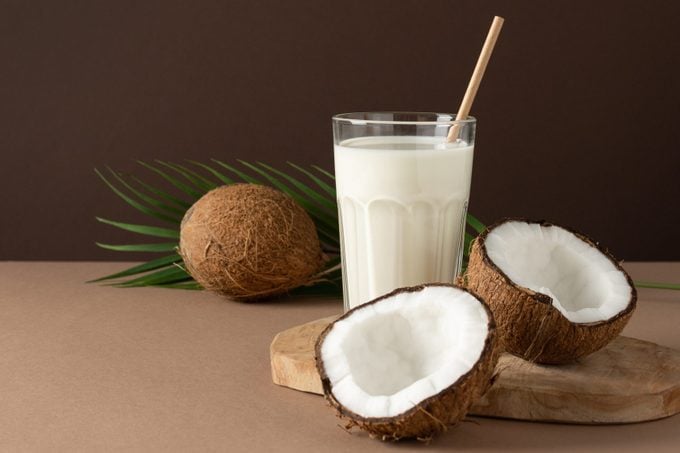
What is coconut milk?
Coconut milk comes in two forms: canned coconut milk and boxed coconut milk. The former is thicker and is typically used mostly for cooking, while the latter is typically used more for drinking. However, the two are easily interchangeable.
Canned coconut milk is typically just coconut, water, and a stabilizer or two such as guar gum. Sometimes, products contain a preservative such as potassium metabisulfite.
You can choose from the regular version and lite coconut milk, which contains significantly fewer calories and fat.
When it comes to boxed coconut milk, you’ll find options in both the refrigerated and unrefrigerated sections—and both sweetened and unsweetened types.
The unsweetened version contains coconut and water, and various ingredients that mainly act as preservatives (including sea salt) and stabilizers. They may also be fortified with vitamin A, vitamin B12, and vitamin D2, calcium, magnesium, selenium, and zinc. Sweetened coconut milk contains added sugar.
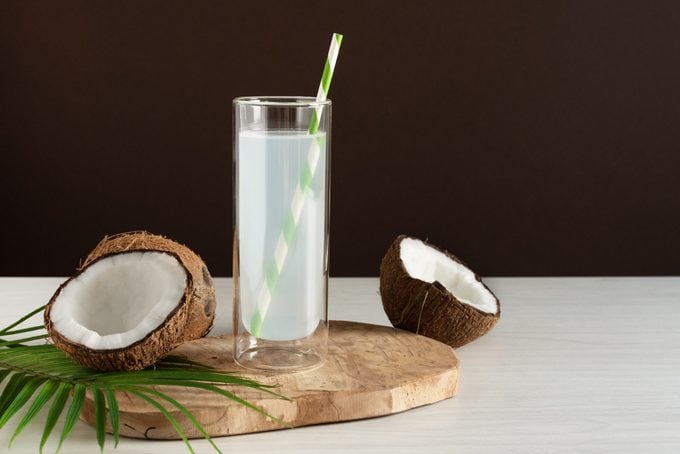
What is coconut water?
Now, coconut water is an entirely different story. Ingredients can be just coconut water or include natural fruit sugar and vitamin C (often as a preservative).
Coconut water comes in boxes, bottles, and cans—and can be refrigerated or shelf-stable. You’ll also find flavored coconut water, such as watermelon and even espresso—as well as varieties with MCT oil.
Of course, if you’re on a tropical island, you may be able to drink coconut water from an actual coconut—and then, you’d be sipping just the coconut’s liquid.
How to shop for coconut milk and coconut water
When it comes to choosing a coconut milk or coconut water, you have many considerations. For coconut milk, think about how you intend to use the product.
“The canned varieties are best used in recipes that need a creamy texture,” says Lorencz.
“If you’re looking to whip coconut milk or create an ultra-creamy texture, purchase full-fat coconut milk. If you want a version that contains less fat and calories but where the texture will be thinner, opt for light coconut milk.”
Canned coconut milk works well in curries, ice cream, and even vegan cookie doughs.
You can use boxed coconut milk in baked good recipes, such as cookies or muffins, as well as in pineapple smoothies and mandarin orange smoothie bowls.
You’ll also want to avoid added sugars when possible. Doing so is easy—simply look for the word “unsweetened” on a beverage’s label. Oftentimes, you’ll find vanilla-flavored plant-based milks that are naturally flavored and contain no added sugars.
Similar rules apply to coconut water.
“When buying coconut water, watch out for added sugars,” notes Lorencz. “Some brands have only coconut water, but some—especially the flavored varieties—can be loaded with added sugar.”
Very few coconut milks contain carrageenan these days, but most experts recommend shopping for a milk sans the ingredient. “This is a controversial ingredient that may cause digestive issues and inflammation,” notes Davis.
A nutritional comparison of coconut milk and coconut water
The nutritional profiles of the two beverages are very different, mainly because coconut milk contains coconut cream and coconut water does not. Let’s take a look at the nutritional make-up of each, including daily values (DVs).
Coconut milk
This nutritional information is per cup.
Calories: 78
Protein: 1 gram (2 percent DV)
Carbohydrates: 7 grams (3 percent DV)
Fat: 5 grams (6 percent DV)
Saturated fat: 5 grams (25 percent DV)
Fiber: 0 grams (0 percent DV)
Calcium: 459 milligrams (35 percent DV)
Iron: 1 milligram (6 percent DV)
Potassium: 46 milligrams (1 percent DV)
Sodium: 46 milligrams (2 percent DV)
Coconut water
This nutritional information is per cup.
Calories: 46
Protein: 2 grams (2 percent DV)
Carbohydrates: 9 grams (3 percent DV)
Fat: 0 grams (0 percent DV)
Saturated fat: 0 grams (0 percent DV)
Fiber: 3 grams (11 percent DV)
Calcium: 58 milligrams (4 percent DV)
Iron: 1 milligram (6 percent DV)
Potassium: 600 milligrams (13 percent DV)
Sodium: 252 milligrams (11 percent DV)
So you’ll see that coconut milk contains more calories, fat, saturated fat, and calcium than coconut water. Coconut water has more protein, fiber, potassium, and sodium.
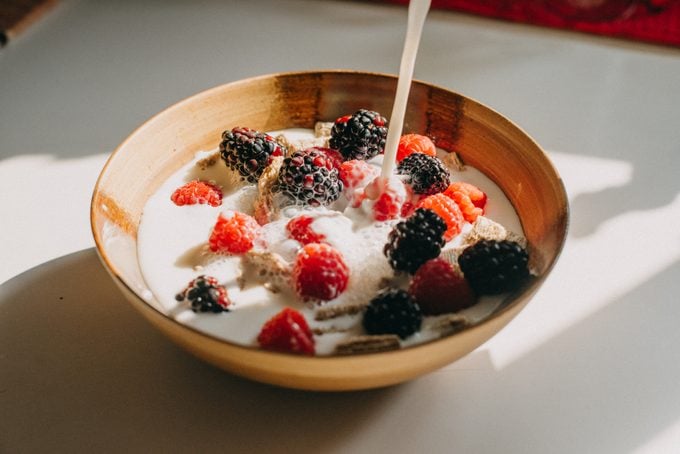
Nutritional benefits of coconut milk and coconut water
Coconut milk benefits
Coconut milk contains ample fat—which, when eaten in moderation, can help heighten feelings of fullness.
“The high fat content and calories provided by coconut milk can increase satiety after a meal, leading to less overall calorie intake,” says Lorencz.
“This is even though coconut milk can contain a significant amount of calories itself. If you’re in tune with your hunger, adding some coconut milk [to a meal] can increase satisfaction after a meal and lead to less snacking or overeating later in the day.”
And in one small study in the Journal of Nutrition and Metabolism, people consuming coconut milk saw cholesterol-helping effects.
“Coconut milk may benefit people with normal or high levels of cholesterol,” says Harpst.
“A two-month study showed that individuals who ate coconut milk porridge had lower LDL ‘bad’ cholesterol and higher levels of HDL heart-protective cholesterol, compared to individuals who ate soy milk porridge.”
Coconut water benefits
As for coconut water, many nutrition experts—myself included—favor the beverage for post-workout hydration.
“Coconut water is a great way to hydrate after a [harder] workout because of all the important nutrients it contains,” says Lorencz.
“Unlike regular water, coconut water can have up to 20 percent of the DV of potassium and 10 percent of the recommended daily intake of sodium [per serving] to help replenish electrolytes after a sweat session.”
You can even make your own DIY sports drink with coconut milk, as does Harpst.
“A homemade sports drink made with coconut water, a pinch of salt, and fruit juice can help rehydrate individuals during and after intense exercise.”




















